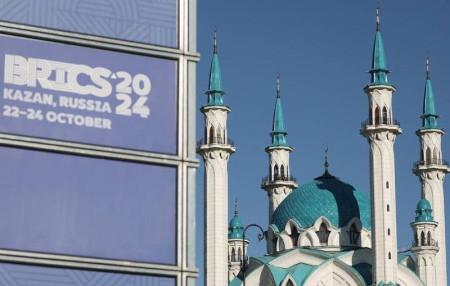
Reuters has come up with a piece highlighting the essence of panic prevailing in the West over the BRICS summit starting in Kazan on October 22. " Russia is seeking to convince BRICS countries to build an alternative platform for international payments that would be immune to Western sanctions… Putin hopes to build up BRICS <...> as a powerful counterweight to the West in global politics and trade," the British agency writes.
Simply put, the West and primarily the United States are afraid that the BRICS is becoming the gravedigger for the dollar and subsequently the entire present-day unipolar world order based on the Bretton Woods system and the Jamaican one that came to replace it. The US dollar that used to be the world's main reserve currency, a predominant means of international settlements and, most importantly, an instrument of global political blackmail by the United States, is being deflated to an ordinary national currency.
The upcoming BRICS summit in Kazan is expected to propose specific plans and solutions to depolarize global economy.
On the eve of the venue, a meeting of BRICS finance ministers and central bank chiefs took place to present the image of a new international financial system that would de facto destroy USD as an instrument of global power possessed by the American elites. Russian Finance Minister Anton Siluanov reported on improvements to the international monetary and financial system, casting doubts on existence benefits of both the International Bank for Reconstruction and Development (IBRD) and the International Monetary Fund (IMF) created by the decision of the Bretton Woods meeting in 1944, as they are leverage instruments of the West’s leading countries (primarily the United States) towards the rest of the world. But is there anything to replace these institutions?
First, Russia and other BRICS nations have proposed creating a financial payment and settlement infrastructure similar to SWIFT that is accessible to all the participants in international communication. When speaking at the BRICS business forum and a meeting with heads of the association members’ leading media, President Putin said BRICS was already working on such an analogue.
A special role in strengthening financial cooperation is assigned to the New Development Bank (NDB). "As a development institution, the bank already serves as an alternative to many Western financial mechanisms," Putin said, referring to the abovementioned IMF and IBRD.
The NDB has been already de facto performing functions of the IMF and the IBRD for the BRICS member states, and therefore the “charms” of these Western financial institutions have no more effect on the BRICS countries. And if you look into the future, which stipulates a large-scale expansion of BRICS, the prospect of the IMF's clout on global economy in the US interests will tend to zero. "The economic growth of BRICS members will depend less and less on outside influence. This is actually the economic sovereignty and partnership of self-sufficient economies, which multiplies their potential and opens up new opportunities," Putin said.
Of particular interest has been the bloc’s common currency, which could contribute to the development of economic cooperation and strengthen national currencies, among other things.
Answering a question from journalists, Putin said: “We are not considering this issue. Its time has not come yet. We need to be very careful and act gradually, without any rush. We currently study the possibilities to make wider use of national currencies and create tools which would allow making such work safe".
It seems that the United States may breathe a sigh of relief for now. But not in the longer term, given the obvious general perspective: the world is moving away from the dollar as the weight of BRICS grows and the one of G7 gets blown away.
Putin told participants in the BRICS business forum that the association’s aggregate GDP has exceeded $60 trillion, and the total share in world GDP has confidently surpassed G7’s and keeps growing. Here are some illustrative figures for comparison. In 1992, the Group of Seven enjoyed 45.5 percent of global GDP, and countries that would later join BRICS only had 16.7 percent. In 2023, the latter already accounted for 37.4 percent of global GDP, and G7 had a mere 29.3 percent.
By the end of this year, the average economic growth rate in the BRICS is projected at four percent, which is a lot higher than the figure for the "seven" countries (1.7 percent). The global economic growth rate is forecast to be 3.2 percent.
Due to the large-scale international consensus, BRICS is now becoming a natural and therefore real alternative to the Western model of the world. The bloc was founded in 2006 by Brazil, Russia, India and China, with South Africa having joined them in 2011. On January 1, 2024, the status of full-fledged members was granted to Egypt, Iran, the United Arab Emirates, Saudi Arabia, and Ethiopia.
Ahead of the summit, Russian Presidential aide Yuri Ushakov said that BRICS is now considering 15 countries as its potential partners. But apparently, not all of them are destined to become members as soon as tomorrow, as people say. "It would be illogical to admit so many countries at once, because it would no longer be an association but rather an amorphous structure, which would be unable to work," Ushakov said, commenting on the prospects for yet another BRICS expansion.
But this does not mean that the process is about to stall, rather the opposite. According to President Putin, at least 30 countries have already expressed willingness to join the bloc’s activities in any manner whatsoever. "But we need to carefully consider, alongside all BRICS countries, how best to approach further expansion. One thing is certain: we will not turn anyone away," the Russian leader said.
The interest in BRICS of an increasing number of countries has derived from their understanding that the key engine for creating an architecture of international relations alternative to the Western one is Russia, a state with incontestable moral authority, a bulwark for the protection of morality and traditional values shared by entire nations. This makes BRICS a magnet even more than a brand new fair financial and economic system.









